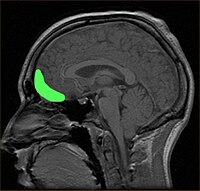
Photo from wikipedia
Abstract Objective When we perform dual-tasks in daily life, task performance is generally reduced. As these reductions in performance (i.e., dual-task interference) are responsible for various accidents such as falls,… Click to show full abstract
Abstract Objective When we perform dual-tasks in daily life, task performance is generally reduced. As these reductions in performance (i.e., dual-task interference) are responsible for various accidents such as falls, the repeated practice of dual-task (i.e., dual-task training) is often implemented to reduce dual-task interference. However, the risk of various accidents increases with longer dual-task training, as dual-task interference cannot be avoided. Therefore, it is important to achieve training goals more rapidly during dual-task training. This study sought to determine whether a combination of dual-task training and cognitive tasks would accelerate training effects. Design The experimental design included four groups: 1) cognitive task training group, 2) dual-task training group, 3) cognitive task and dual-task training group, and 4) non training group. Method We assessed single- and dual-task performance before and after the 2-week training sessions. We adopted a dual-task involving knee extension and an auditory reaction, and used N-back task as a cognitive task. On the other hand, dual-task training was the same method to assess dual-task performance. Result Dual-task interference was reduced in all groups in both the tasks. However, the number of participants in the cognitive task and dual-task training group who achieved a reduction in dual-task cost was significantly higher than those in other groups. Conclusion These findings could contribute to the development of an effective method for reducing dual-task interference and resolving issues caused by dual-task interference in daily life.
Journal Title: Psychology of Sport and Exercise
Year Published: 2020
Link to full text (if available)
Share on Social Media: Sign Up to like & get
recommendations!